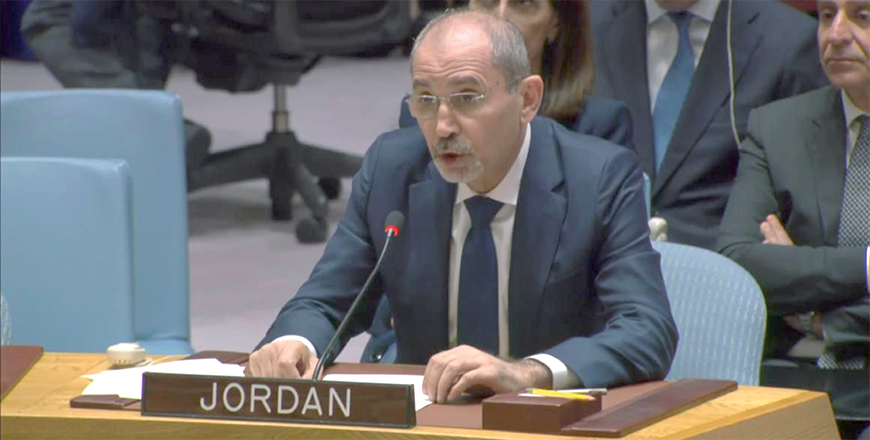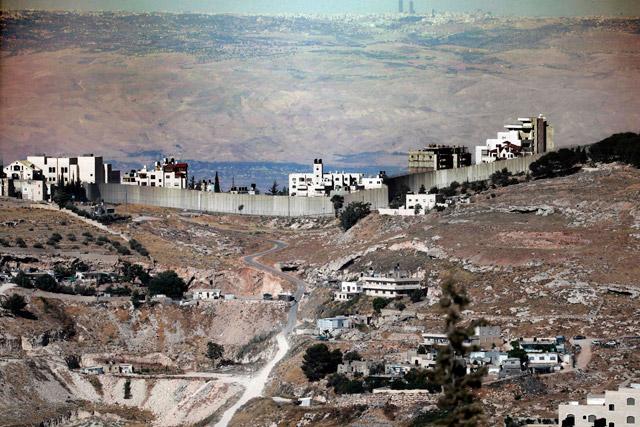You are here
Former FM highlights challenges in Israeli strategy, advocates ending occupation on Palestine
By Mays Ibrahim Mustafa - Oct 31,2023 - Last updated at Nov 01,2023

Former foreign minister of Jordan Marwan Muasher speaking during a seminar organised by the Jordan Press Foundation on Monday under the title: “Post Al Aqsa Flood Scenarios” (Petra photo)
AMMAN — Israeli plans to eliminate Hamas by destroying its military power will prove “futile”, as it has grown from an organisation into an ideology, which means that even if Israel succeeds in eliminating it, “multiple Hamas movements would emerge in its place”, said former foreign minister of Jordan Marwan Muasher.
He made his remarks during a seminar organised by the Jordan Press Foundation (JPF) on Monday under the title: “Post Al Aqsa Flood Scenarios”.
Ending Israeli occupation, main solution for ‘conflict’
Muasher noted that Israel has recently focused its efforts on making use of the media to portray Palestinians as “less than human”, and equate operation “Al Aqsa Flood”, launched by Hamas’ Al Qassam Brigades on October 7, to the September 11 attacks, a narrative that “appeals to” the average westerner, unfamiliar with the region’s history and the developments leading up to the ongoing war.
That is why media efforts, especially those directed towards the western audience should focus on bringing the ongoing developments into their original context, which is the “Israeli occupation” of Palestinian territories, considered the “longest in modern history”, in addition to the 17-year blockade imposed on Gaza by Israel, he added.
Musher stressed that no military solution carried out by Israel will end the “conflict”. He said that the main goal of any related political efforts should be focused on ending the Israeli occupation, otherwise the “cycle of violence will continue”.
He also pointed out that the US has “reduced” the Arab-Israeli conflict into normalisation agreements with Arab countries, claiming that these will create a “positive” atmosphere in the region to facilitate future negotiations with the Palestinian side.
However, the operation on October 7 revealed the “fragile” reasoning behind these agreements that didnot relate to the Palestinian cause or condition Israeli withdrawal from Palestinian territories, he said.
It showed that without an agreement with the Palestinian side, normalisation with Arab countries is “pointless”, added Muasher.
Jordanian stance
Muasher said that there was a “harmony” between the popular and the official Jordanian stance towards the war on Gaza.
He noted that the official stance is apparent in the European tour carried out by His Majesty King Abdullah to rally international support, and the Jordan-drafted UN resolution calling for a ceasefire, which was adopted by the General Assembly last week.
He also referenced the King’s speech during the Cairo Summit for Peace, highlighting His Majesty’s use of terms such as “genocide” and referring to Israel as an “apartheid state”.
Forced displacement of Palestinians
He also discussed eminent displacement threats in both Gaza and the West Bank, disrupted by Palestinians’ strong attachment to their land, in addition to the Jordanian and Egyptian position.
Musher believes that if Israel was concerned for Palestinian civilians as it “claims”, it would have opened its borders for them, allowing them to go to the West Bank, not Egypt.
He added that there is an ongoing “ethnic cleaning” of Palestinians in Area C of the West Bank, where Israeli settlers distribute flyers warning of a “second Nakba” and give Palestinians 24 hours to empty their villages, by threat of force under the protection of the Israeli army.
Regional players
Muasher views that whereas Iran might have helped arm and train Hamas, it didnot know of or plan the operation on October 7. He also said that it is still unlikely that Hizbollah will enter a war with Israel, although that may change if new realities emerge.
Hizbollah will not deploy the “significant military capabilities” it has built, unless it believes that the “facts” and “circumstances” are favourable, and not as a reaction, Musher added.
Related Articles
AMMAN — Deputy Prime Minister and Foreign Minister Ayman Safadi on Tuesday urged the United Nations Security Council (UNSC) to end Israeli v
OCCUPIED JERUSALEM — Fifty years after Israel occupied the Palestinian territories, its policies in the West Bank and Gaza are at the root o
The latest mini-war between Israel and the Islamist group Hamas began with the Gaza-based fighters eager to strike a blow, but the escalation that followed has left them physically and diplomatically exposed, with no ready way out.



















